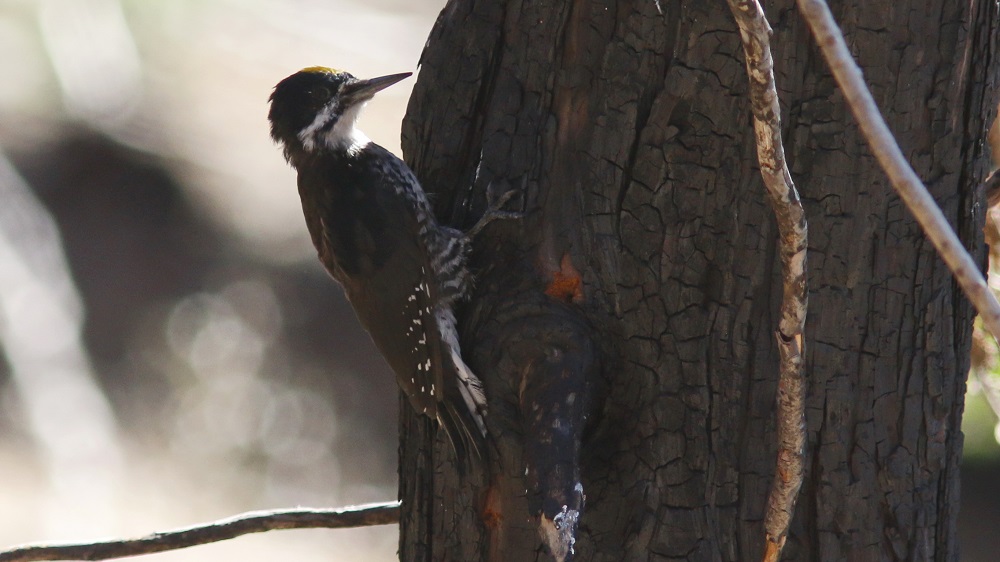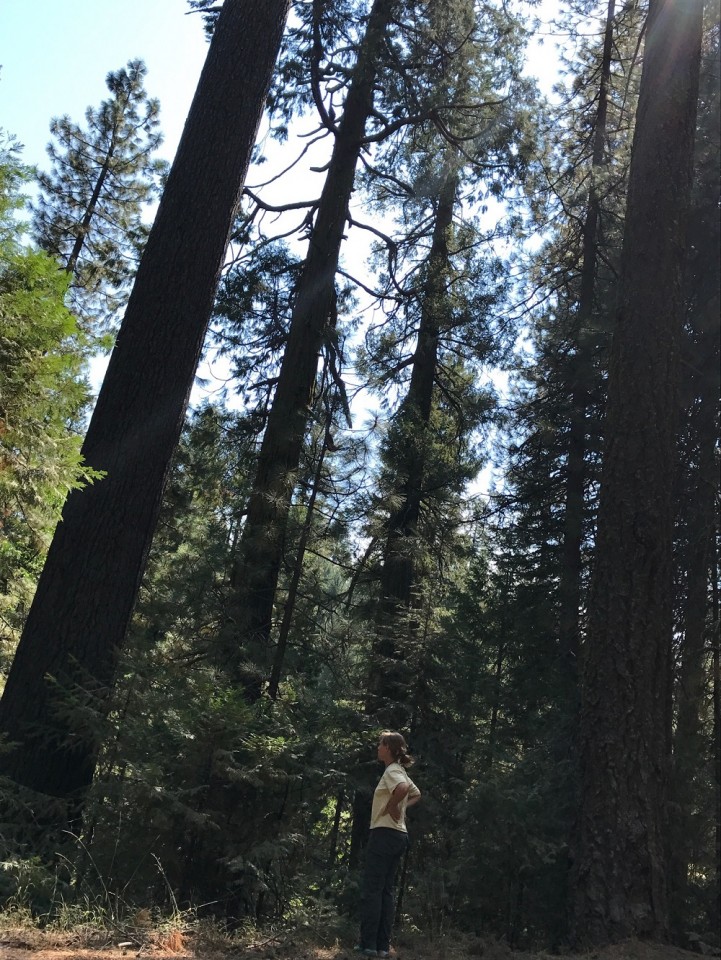 |
| Naturally regenerating snag forest habitat that is prime foraging habitat for the endangered Pacific fisher and is being threatened by post-fire logging on the Stanislaus National Forest. (Rim Fire photo by Chad Hanson, John Muir Project.) |
Earth Island's John Muir Project goes to court to enforce federal environmental laws in national forests, including the National Environmental Policy Act (NEPA), the National Forest Management Act (NFMA), and the Endangered Species Act (ESA), in order to ensure that federal public forestlands are managed to provide optimal ecological conditions to support and restore the full complement of native biodiversity in these forest ecosystems, which have been severely degraded and damaged by decades of commercial logging and suppression of wildland fires.
On June 13, 2022, the John Muir Project filed a lawsuit against the United States National Park Service to stop a large, unprecedented logging project in Yosemite National Park. The logging project is being conducted without any environmental analysis or public input. The lawsuit alleges violations of the National Environmental Policy Act, the Administrative Procedures Act, and the National Park Service Organic Act. Tom Buchele of Earthrise Law Center is representing the John Muir Project in this case.
In Yosemite National Park, a fight over how to protect the world’s largest trees in a warming world
The Case Against Commercial Logging in Wildfire-Prone Forests
California is desperate to stop mega-fires. But controversy rages over tree thinning
Logging Halted in Yosemite National Park
On April 27, 2022, the John Muir Project, in coalition with environmental, business, and recreational organization, filed a lawsuit against the U.S. Forest Service over its decision to allow commercial logging and vegetation removal atop Pine Mountain and Reyes Peak in Los Padres National Forest. The project area is located on ancestral lands of the Chumash, and is designated critical habitat for the endangered California condor. The lawsuit alleges violations of the National Environmental Policy Act, Roadless Area Conservation Rule, Endangered Species Act, and National Forest Management Act. Environmental Defense Center is representing the John Muir Project in this case.
On March 26, 2021, the John Muir Project, along with Unite the Parks and Sequoia Forestkeeper, filed a lawsuit against the U.S. Fish and Wildlife Service and U.S. Forest Service over the decision to allow logging in the central Sierra Nevada mountain range, which constituted habitat for the endangered Pacific fisher. The lawsuit alleged violations of the Endangered Species Act and the National Environmental Policy Act. On April 20, 2021, the plaintiffs filed a motion for a preliminary injunction to halt the Forest Service from moving forward with logging in Summer 2021. Rene M. Voss represented the John Muir Project in this case.
On September 16, 2019, the John Muir Project, Sequoia Forestkeeper, Greenpeace, and Dr. James Hansen filed a lawsuit against the U.S. Department of Housing and Urban Development (HUD), the California Department of Housing and Community Development, and the U.S. Forest Service challenging HUD's approval of disaster relief funds for clearcut logging in newly regenerated forestland, which serves as important wildlife habitat, and an associated biomass power plant. The lawsuit alleges violations of the National Environmental Policy Act, Administrative Procedures Act, HUD regulations, and the Disaster Relief Appropriations Act of 2013. Meriel L. Darzen of Crag Law Center and Daniel Galpern are representing the John Muir Project in this case.
On July 15, 2019, the John Muir Project, Mountain Communities for Fire Safety, and Lost Padres Forestwatch filed a lawsuit against the U.S. Forest Service challenging a commercial logging project that would cut medium to large trees and eliminate native shrubs in the Cuddy Valley community. The lawsuit alleges violations of the National Environmental Policy Act and the National Forest Management Act. Rene M. Voss is representing the John Muir Project in this case, and it is currently on appeal to the United States Court of Appeals for the Ninth Circuit.
On July 10, 2019, the John Muir Project, Los Padres Forestwatch, and Center for Biological Diversity filed a lawsuit against the U.S. Forest Service and the U.S. Fish and Wildlife Service over its proposal to allow logging in a roadless area that contains as many as 50 California condor roosting sites. Specifically, the lawsuit alleges improper use of a categorical exclusion under the National Environmental Policy Act and a violation of the Endangered Species Act. Justin Augustine of the Center for Biological Diversity is representing the John Muir Project in this case.
On July 9, 2019, the John Muir Project and the Center for Biological Diversity filed a lawsuit against the U.S. Forest Service alleging various claims under the Administrative Procedures Act and the National Environmental Policy Act. The challenge relates to the agency's proposal to remove mostly live trees on over 9,000 acres in the Inyo National Forest, near Mammoth Lakes, California. Tom Buchele of EarthRise Law Center and Justin Augustine of the Center for Biological Diversity are representing the John Muir Project in this case.

On March 7, 2018, the John Muir Project and Sequoia Forestkeeper filed a lawsuit against the U.S. Forest Service challenging two tree removal projects, one in Sequoia National Forest (Bull Run project) and the other in the Giant Sequoia National Monument (Spear Creek project). In both instances, the Forest Service bypassed environmental review requirements by relying on the use of categorical exclusions, despite the existence of extraordinary circumstances, which prevent the use of categorical exclusions. Rene P. Voss and Matt Kenna represented the John Muir Project in this case.
Photo by Alison Sheehey, Sequoia Forest Keeper
On December 12, 2016, the John Muir Project and Sequoia Forestkeeper filed a lawsuit against the U.S. Forest Service over its failure to consider significant new circumstances and information with respect to three proposed timber sales. Additionally, the Forest Service failed to consider the combined potential of these projects to adversely affect Pacific fisher, California spotted owl, and northern goshawk habitat. As a result of this legal challenge, the Forest Service prepared additional environmental analysis of the project. Rene P. Voss and Matt Kenna represented the John Muir Project in this case.
 On September 29, 2016, the John Muir Project and Center for Biological Diversity filed a lawsuit challenging the United States Forest Service over its proposed green tree timber sale in California spotted owl habitat. Specifically, they challenged the use of a categorical exclusion to avoid environmental analysis of this project, which allowed for the logging of live and dead trees across 2,700 acres of Tahoe National Forest. Justin Augustine of Center for Biological Diversity and Rene P. Ross represented the John Muir Project in this case.
On September 29, 2016, the John Muir Project and Center for Biological Diversity filed a lawsuit challenging the United States Forest Service over its proposed green tree timber sale in California spotted owl habitat. Specifically, they challenged the use of a categorical exclusion to avoid environmental analysis of this project, which allowed for the logging of live and dead trees across 2,700 acres of Tahoe National Forest. Justin Augustine of Center for Biological Diversity and Rene P. Ross represented the John Muir Project in this case.
On August 31, 2015, the John Muir Project and Center for Biological Diversity filed a lawsuit in the United States District Court for the Eastern District of California challenging the environmental analysis conducted by the U.S. Forest Service for a logging project in the French Fire area of Sierra National Forest. Specifically, the lawsuit challenged the failure to provide for notice and comment on the project's impacts, failure to take a "hard look" at the impacts in the roadless areas, and failure to prepare an Environmental Impact Statement. As a result of this challenge, the court enjoined the Forest Service from conducting further logging in the roadless areas unless and until it provided for notice and comment, and responded to those comments. Attorneys from the Center for Biological Diversity represented the John Muir Project in this case.
On July 30, 2015, the John Muir Project joined Center for Biological Diversity in seeking an injunction against the U.S. Forest Service overs its plan to allow logging on about 14,000 acres in Lassen National Forest. The proposed logging threatened burned forest habitat, which is critical habitat for the black-backed woodpecker. Justin Augustine of the Center for Biological Diversity and Sean Malone represented the John Muir Project in this case.
In July 2014, the John Muir Project joined Center for Biological Diversity in seeking an injunction against the U.S. Forest Service over its plan to allow logging on almost two thousand acres in Sierra National Forest. The area of the proposed logging was important habitat for the California spotted owl, the Pacific fisher, and the black-backed woodpecker. Rachel Fazio, associate director and staff attorney of the John Muir Project, and Justin Augustine of the Center for Biological Diversity represented the John Muir Project in this case.
On July 22, 2014, the John Muir Project joined Center for Biological Diversity in seeking an injunction against the United States Forest service over its plan to allow logging on tens of thousands of acres in Tahoe National Forest. The proposed logging threatened burned forest habitat, which is critical habitat of the black-backed woodpecker. Rachel Fazio, associate director and staff attorney of the John Muir Project, and Justin Augustine of the Center for Biological Diversity represented the John Muir Project in this case.
On September 4, 2014, the John Muir Project joined two other organizations in seeking an injunction against the U.S. Forest Service over its plan to allow logging in 52 square miles of the Stanislaus National Forest. The proposed logging threatened critical California spotted owl habitat and sought to prevent logging on 40 percent of the area in order to create a buffer between nests and roosting sites and logging operations. Rachel Fazio, associate director and staff attorney of the John Muir Project, and Justin Augustine of the Center for Biological Diversity represented the John Muir Project in this case.
On August 11, 2008, the John Muir Project filed a lawsuit in the United States District Court for the Eastern District of California challenging the scientific integrity and accuracy of the environmental assessment conducted by the U.S. Forest Service for a timber sale in the Champs area of Lassen National Forest. As a result of this challenge, the court enjoined the Forest Service from moving forward with the timber sale contracts until completion of an adequate and sufficient environmental review under the National Environmental Policy Act. Rene P. Voss and Rachel Fazio, associate director and staff attorney of the John Muir Project, represented the John Muir Project in this case.
